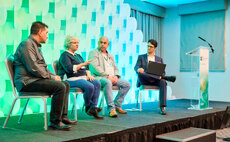Salvation Army is rolling out BYOD on a step-by-step basis so as not to ruin what it set out to achieve
"Effectively we've been doing BYOD for more than 10 years," said Phil Durbin head of corporate systems of the Salvation Army in the UK and Ireland. "The difference is that now it's being driven ...
To continue reading this article...
Join Computing
- Unlimited access to real-time news, analysis and opinion from the technology industry
- Receive important and breaking news in our daily newsletter
- Be the first to hear about our events and awards programmes
- Join live member only interviews with IT leaders at the ‘IT Lounge’; your chance to ask your burning tech questions and have them answered
- Access to the Computing Delta hub providing market intelligence and research
- Receive our members-only newsletter with exclusive opinion pieces from senior IT Leaders























